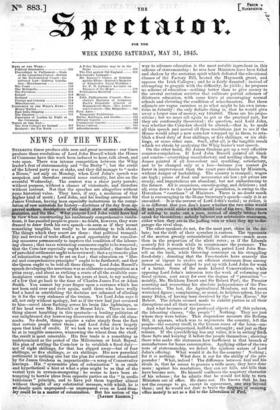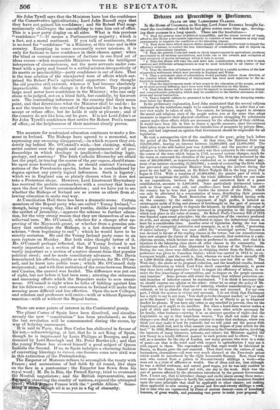NEWS OF THE WEEK.
STIRRING times produce able men and great measures : our times • produce those resolutions of Lord John Russell which the House ef Commons have this week been induced to hear, talk about, and vote upon. There was intense competition between the Whig leader's feat of statesmanship and "the Derby " ; but the credit of the Liberal party was at stake, and they did manage to "make a House," not only on Monday, when Lord John's speech was unspoken and therefore created some curiosity, but also on the • eventful Wednesday. The contest was a sheer party parade; without purpose' without a chance of vicissitude, and therefore without interest. Not that the speeches are altogether without some historical value. They have, if any, a modicum of that higher kind of merit ; Lord John, and his leading antagonist Sir -James Graham, having been especially industrious in the compi- lation of raw materials for history—doctrines of the day from ap- proved authors, descriptions of the social state of certain classes, statistics, and the like. What purpose Lord John could have had In view when constructing his cumbrously comprehensive resolu- tions, it has puzzled people to guess : no doubt, however, they were framed to draw forth his own speech—to seem as if they meant something tangible, but really to be something to talk about. The things which they assert are these : that political tranquil- lity and revival of trade afford a good opportunity for consider- ing measures permanently to improve the condition of the labour- ing classes' that taxes restricting commerce ought to be removed ; that the Corn-law especially ought to be remodelled ; that the law of parochial settlement ought to be reviewed; that a systematic plan of colonization ought to be set on foot that education on " libe- ral rind comprehensive principles" ought to be furthered; and that the Queen ought to be told all those things. Lord John Russell's speech developing the assertions was as elaborate a composition as a -prize essay, and about as striking a cent° of all the available com- monplaces current for the last ten years at least, to say nothing ef a few that go back to the time of Charles James Fox or Adam Smith. You cannot lay your finger upon a sentence which has -not been said over and over again, until those who have really had a hand in establishing the doctrine are ashamed of alluding to it for the very staleness of the truism. Yet Lord John says it all, not only without apology, but as if the view had just occurred • to hint—novel ideas flashing across his brain like lightnings, as if his head were Mr. Disimeli's or Mount Ida's. There is some- thing almost humbling in this spectacle—a leading politician of our enlightened day borrowing discoveries from all the old alma- nacks. No doubt, things acquire a value simply from the fact that certain people utter them ; and Lord John drew largely upon that kind of credit. If we look to see what it is he would be at in tangible measures, winnowing the wheat from the chaff, the result is most miserable. His free trade is a something as undetermined as the period of the Millennium or Irish Repeal. His plan of settling the Corn-law is to establish a fixed duty— not of eight shillings, for that has slipped away—but of four shillings, or five shillings, or six shillings. His new parochial settlement is nothing else but the plan for settlement abandoned by Sir James Graham as impracticable—a scrap of Conservative leavings. His " systematic plan of colonization" is as crude and hypothetical: a hint at what a plan might be as that of the veriest tyro in system-mongering : he seems to have been at- tempting to borrow ideas from opposite parties on the "in medic' tutissimus " principle, and to have put them together almost without thought of any substantial measure, with which he is evIdently quite unprepared—as unprepared even as Lord Stan- ley could be in a matter of colonization. But his notion of the way to advance education is the most notable ingredient in this scheme of statesmanship : he sees how Ministers have been foiled and shaken by the sectarian spirit which defeated the educational clauses of the Factory- Bill, hooted the Maynooth grant, and opposes the Irish Colleges; • and he is fairly daunted : instead of attempting to grapple with the difficulty, he yields; he proposes no scheme of education—nothing better than to give money to the several sectarian societies that cultivate partial schemes of dilettante education, with some hints at encouraging normal schools and elevating the condition of schoolmasters. But these adjuncts are vague surmises as 4o what might be his own inten- tions in futurity : the only definite thing is, that he would give away a larger sum of money, say 150,0001. These are his propo- sitions ; but we must sift again to get at the practical part, for they are confessedly theoretical : the question, said Lord John, was whether the Corn-law should be altered,—that is, he made all this speech and moved all these resolutions just to see if the • House would adopt a new corn-law wrapped up in them, to esta- blish a fixed duty of four shillings, or five shillings or six shil- lings, or some other sum. Such, after all, is the tangible result which we obtain by analyzing the Whig leader's vast speech. • On the other hand, Sir James Graham got up a very effective counter-compilation. If Lord John Russell painted all black and sombre—everything unsatisfactory and needing change, Sir James painted it all rose-colour and sparkling, satisfactory, and to be changed only at a loss—because you cannot go faster in improvement than the exact pace chosen by Ministers, without danger of backsliding. The country is tranquil ; wages are high ; prices of food and necessaries are low; yet prices are steady, and importations are abundant, but not embarrassing to the farmer. All is auspicious, smooth-going, and delicious ; and all, even down to the vast increase of population, is owing to the .Herculean "exertions " of Ministers. There is no doubt much that is encouraging in the Home Secretary's speech—only it is so one-sided. It is-the reverse of Lord John's medal; or rather, it is so different that you don't know whether the two sides would fit and you could make a whole medal out of the two, This comes of talking to make out a case, instead of simply letting facts speak for themselves : nobody believes our aristocratic statesmen, either when theynre in the puffing vein or when they try to dis- parage the rival shop. • The other speakers do not, for the most part, shine in the de- bate; but the drift of their speeches is curious. The opponents of the motion greatly outnumbered its advocates—much more than in the proportion- of the silent votes; as if the Liberals scarcely felt it worth while to countenince the pretence. The Free-traders' represented_by Mr. Villiers, patted Lord John Rus- sell on the back, while throwing contempt on his struggling fixed-duty; denoting that the }lee-traders have scarcely the power or vigour to eirolve an efficient statesman from among themselves, and are . obliged to put up with Lord John for want of a better. Some of the more Liberal Conservatives, while opposing Lord John's intrusion into the work of reforming our fiscal system, cast away for ever the dogma of "protection '°- notably, Mr. Bickham Escott and Sir Robert Peel; the Premier asserting and reasserting his absolute independence of the Pro- tectionists. The last, the Agricultural Members, cut the most wretched figure; complaining, as usual, in helpless.spleen, like so many Didos, of having been deceived by the " pius 2Eneas," Sir Robert. The debate seemed made to exhibit parties in all their disruptions and all their weaknesses. And what becomes of the professed objects of all this palaver, the labouring classes; "the: people" ? Nothing. They are just where they were before: That stupendous measure the Reform Bill, it appears, which was to regenerate the country, left the people—the country itself, in the human sense of the term—un- represented, half-pauperized, half-fed, untaught; and just sa they remain. If the speechifying has any value, it is in setting forth those facts and keeping it before the people themselves; • showing those who make the statesman how inefficient is that branch of manufactures for home consumption. Applying either of the two tests of statesmanship, we detect the spurious nature of Lord John's offering. What Would it do for the country ? Nothing ; for it is nothino.. What does it say for the ability of the pro- p?under ? What, indeed The difference between hid and his rivals is, that he seems to promise a trifle more, they have ekme more : against his resolutions, they can set bills, and bills that have become acts. He himself confesses the nugatory character of his scheme ; for he admits that he would not help to turn Ministers out of office. He dares not. He knows that he has not thecourage to gro, except in appearance, one step beyond them ; and he would not dare to brave the disgrace of entering office merely to act as a foil to the Liberalism ot Peel. Sir John Tyre11 says that the Ministers have lost the confidence of the Conservative agrimilturists; Lord John Russell says that they have not gained his confidence ; and Sir Robert Feel mag- nanimously challenges the unconfiding to turn him out of office. This is a poor party display on all sides. What is this precioue "confidence " !—It means a Parliamentary majority ; which is a fact, not a moral sentiment. If you talk of sentiments, there is no need for "confidence "in a Minister, at this time and in this country. Excepting in some necessarily secret missions, it is only for factions to have confidence in their chosen agent: when the blind or corrupt concurrence of factions in one fixed set of ideas ceases—when responsible Ministers become the intelligent interpreters of circumstances, not the mere servants under con- tract with a party, and bound to a settled mission irrespectively of its merits or practicability—party confidence is out of date. That is the true solution of the unexpected turn of affairs which sur- prised Sir Robert Peel's agricultural supporters : they thought the old practice still existent, whereas it had become absolutely impracticable. And the change is for the better. The people at large need never have confidence in the Minister ; who can only claim to be judged, not on a blind faith, but candidly, by his overt acts. The contending influences in the country find their mean point, and that determines what the Minister shall be and do : he is not the trustee but the servant of the national will : he is free to accept or refuse office, but he holds it only at pleasure ; and if the country do not like him, out he goes. It is not Lord John's or Sir John Tyrell's confidence that settles Sir Robert Peel's tenure of office; as the helplessness of their mistrust clearly proves.



























 Previous page
Previous page